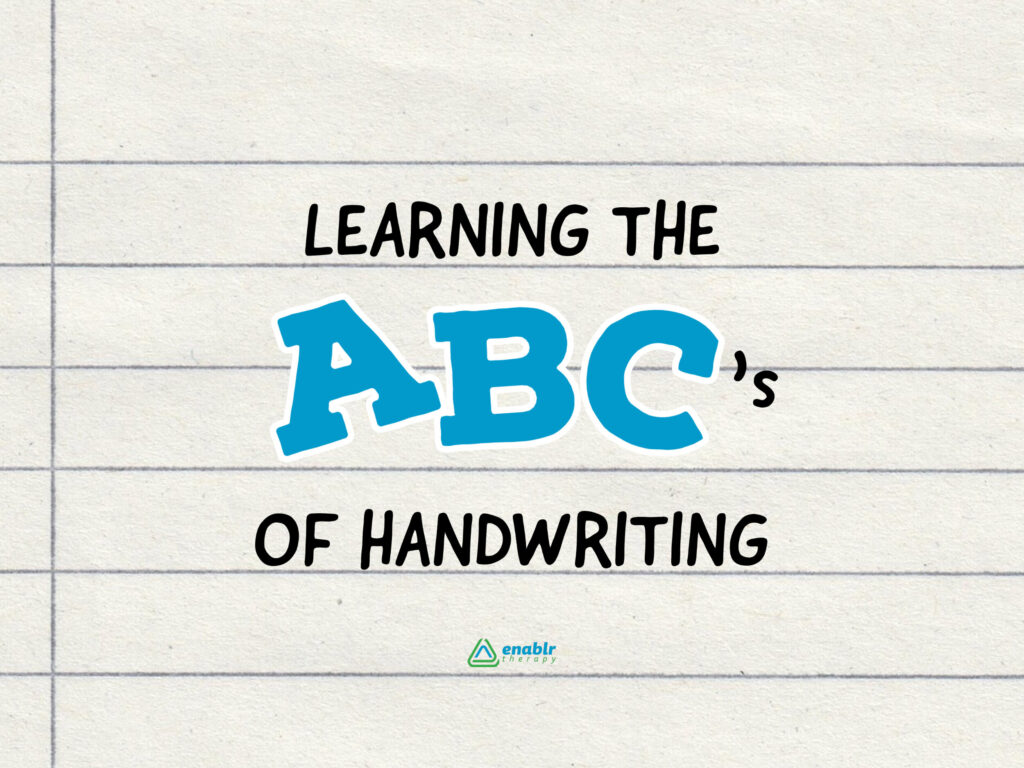
With the prevalent use of technology, keyboarding and dictation seemed to be favored over handwriting. In fact, many schools who are hard pressed for time, have reduced instructional time for print handwriting and ceased teaching cursive all together in favor of keyboarding, technology, and other subjects.
As a result of this shift, many children are struggling with handwriting and parents are left with questions. What are the appropriate developmental expectations for writing? Is handwriting even important anymore? If so, how can I support my child?
The Benefits of Handwriting
According to research, handwriting provides numerous benefits over keyboarding as it activates more areas of the brain. It has been shown to result in better memory, attention, comprehension, use of language, and spelling which fosters improved literacy skills and overall learning. Think about it, how many times have you written something down so that you would remember it better?

In addition, it can be a form of art or personal expression. Each person has their own unique handwriting style that is part of their identity. Writing by hand can be very meaningful and significant. Think about how you feel when you receive a handwritten card. Also consider how many people write in a journal as a mode of self-expression and a way to reduce stress. Handwriting has value.
The Developmental Stages of Handwriting
Just as children follow a developmental sequence when learning to walk, children also follow a particular progression of steps when learning to write. Handwriting is complex. It requires a child to think about what they want to write or draw, visually recall the shapes to be formed and then motor plan the action.
The body then stabilizes larger muscles while allowing the small hand muscles to make precise strokes with the correct spatial orientation, size, alignment, and spacing while holding a pencil just as the brain had planned. In addition, children also need to maintain focus, process information on the paper as well as sensory information around them among other things. It is not an easy skill to learn!
Learning to write takes time and practice. Below is a list of writing developmental milestones that can help you to keep realistic expectations for your child as they build writing skills. Be sure to keep writing fun!
Milestones by Age
1 Year Old
Imitates scribbling
18 Months Old
Scribbles independently
2 Years Old
Imitates a vertical line
2 ½ Years Old
Imitates a horizontal line
3 Years Old
Copies a single circle from a model and imitates a plus (+) sign
4 Years Old
Copies a plus (+) sign
4 ½ Years Old
Copies diagonal lines and a square
Draws a simple person with 2-4 body parts
May be able to copy a few letter or name
5 Years Old
Copies a X and a triangle
Draws a recognizable person
Colors a shape within the lines
Prints own name
Copies most letters
Kindergarten
Learns to write on a line, size letters, and allow spacing
Enablr Therapy believes that partnership with families and school partners is essential to successful therapy. If you have concerns about your child’s handwriting, Enablr Therapy has a team of occupational therapists that can assess a child’s fine motor, visual motor, and handwriting skills and work with parents to ensure that their child is on track. Contact us for more info.
Reference
ScienceDaily. (2020). Why writing by hand makes kids smarter. Retrieved from https://www.sciencedaily.com/releases/2020/10/201001113540.htm
The Beery-Buktencia Developmental Test of Visual Motor Integration Manual. (2010). Pearson Publishing.


